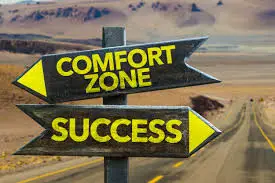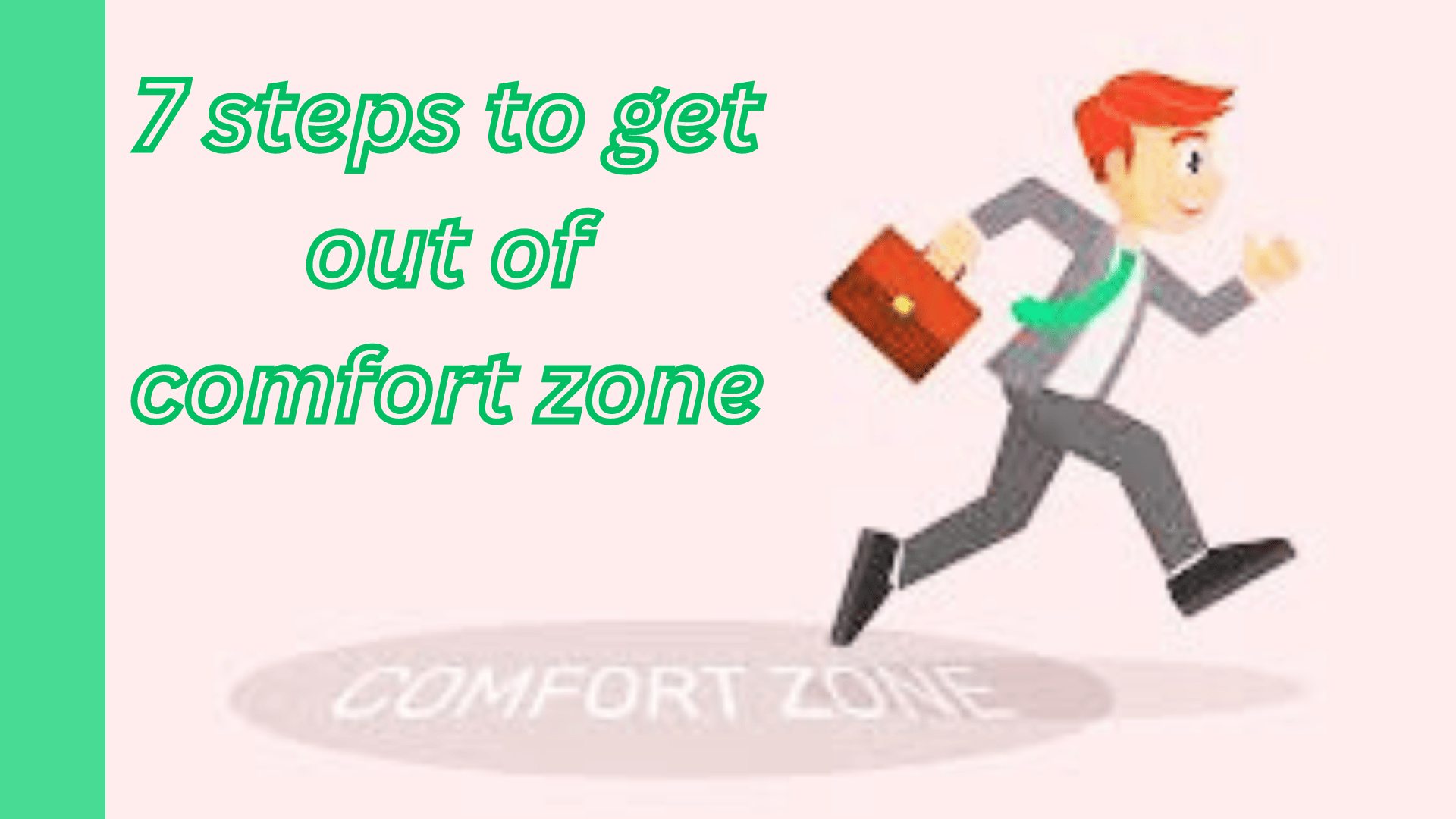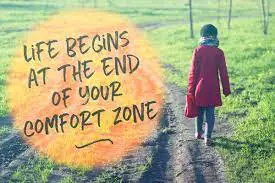Hello friends, welcome to (International Stories) in this story we will discuss 7 steps to get out of comfort zone. How to Leave your Comfort Zone? How to move forward in life when you feel stuck? Completely read this story How to move forward in life when you feel stuck? And How to succeed in life and career?
7 steps to get out of comfort zone
Getting out of your comfort zone can be challenging, but it’s often necessary for personal growth and achieving your goals. Here are seven steps to help you break out of your comfort zone:
Identify your comfort zone:
Start by recognizing the areas of your life where you feel most comfortable and where you tend to avoid challenges or risks. This could be in your career, relationships, personal habits, or any other aspect of your life.
Set clear goals:
Define specific and achievable goals that require you to step outside of your comfort zone. These goals should be meaningful and aligned with your values and aspirations. Having a clear purpose will motivate you to take action.
Take small steps:
Don’t try to leap too far out of your comfort zone all at once. Instead, take gradual, incremental steps towards your goals. This will help you build confidence and reduce the fear associated with change.
Embrace failure as a learning opportunity:
Understand that failure is a natural part of pushing your boundaries. Instead of fearing it, view failure as a chance to learn, adapt, and grow. Embracing failure can make it easier to step out of your comfort zone.
Seek support and accountability:
Share your goals with friends, family, or a mentor who can provide encouragement, advice, and accountability. Having a support system can make it easier to stay committed to your goals.
Develop new skills and knowledge:
To succeed in unfamiliar territory, you may need to acquire new skills or knowledge. Invest time in learning and self-improvement to increase your confidence and competence.
Celebrate your successes:
Recognize and celebrate your achievements, no matter how small they may seem. Acknowledging your progress will boost your confidence and reinforce the positive aspects of stepping out of your comfort zone.
Remember that getting out of your comfort zone is a continuous process. It’s not something you do once and forget about. Regularly challenging yourself and exploring new experiences will lead to personal growth and a more fulfilling life.
How to move forward in life when you feel stuck?
Once upon a time, A king received two birds as gifts. King had never seen such beautiful birds. The king gave the birds to his servant to train them. One day the servant told the king that one bird was flying high and the other could not fly from the branch since the day it came.
The king summoned all the physicians and magicians of the kingdom but no one could blow him away.
The king put the matter before his advisers. Hours turned into days and days turned into months but the bird could not fly. The king decided to find and call someone deeply interested in nature. The king ordered his advisers to find someone who had spent years in the forest.
After a few days, The next day the king was surprised to see the eagle flying in the palace’s gardens. The king called the man who had flown the bird. The man was presented to the king. The king asked,
How did you fly the bird?
He smiled and said, I cut the branch on which the bird was sitting. There are many opportunities to move forward but we do not try to move forward. how to move forward in life when you feel stuck?
What does the comfort zone look like?
It’s easy to do nothing but nothing takes you nowhere. We don’t want to compromise our sense of self or our enjoyment of life. It is simple to become involved in life’s routine tasks. Life is a blessing. Successful people consider it an adventure. Life has many ups and downs. But successful people go through all these ups and downs. The challenges of life make an individual mature. Life is not a bed of roses. This is a bitter reality.
That’s why a lot of people avoid it. People avoid a difficult and uncomfortable situations. They are afraid of failure. But in fact, it is the ups and downs of life which matures a person. Almighty will never change the situation of a nation until they change it themselves. In order to shape one’s personality, one has to accept the challenging situation.
That is because Allah would not change a favor that he had bestowed upon a people until they change what is in themselves.
Conclusion:
The story of the king and the birds provides a valuable lesson on how to move forward in life when you feel stuck. Here are some key takeaways from the story:
Seeking Expertise: When faced with a challenge, it’s essential to seek expertise and advice from those who have relevant experience. The king consulted physicians and magicians but only found success when he sought out someone deeply interested in nature. This underlines the importance of finding the right mentor or guide when trying to overcome obstacles.
Out-of-the-Box Solutions: Sometimes, the solution to a problem isn’t apparent through conventional means. The servant’s approach of cutting the branch to make the bird fly demonstrates the need for creative and unconventional solutions when traditional methods fail.
Overcoming Fear: The bird that couldn’t fly was stuck out of fear. Similarly, in life, fear can often hold us back from taking necessary steps to progress. It’s important to recognize and confront your fears to move forward.
Embracing Opportunities: The servant’s action of cutting the branch represents the idea that sometimes, we need to take bold steps and embrace opportunities even when they seem risky. In life, opportunities for growth may come in unexpected forms, and it’s crucial to recognize and seize them.
Patience and Persistence: The king and his advisers were patient and persistent in their efforts to help the bird fly. Likewise, when facing challenges in life, it’s essential to be patient and not give up easily. Sometimes, it takes time and multiple attempts to find a solution.
In conclusion, the story teaches us that when we feel stuck in life, it’s crucial to seek the right guidance, consider creative solutions, overcome our fears, embrace opportunities, and be patient and persistent in our efforts.
Just like the bird, we have the potential to break free from our limitations and soar to new heights if we are willing to take bold steps and adapt to our circumstances.
We do not try to step out of our comfort zone. New trials and new experiences are the only reason to move forward in life. Face the ordeal is the only way to success. This story was written only for just Motivation, Sadqa-E-Jarea, and Dawah’s work.
Not our purpose to waste your precious time. Your time has more important to us. Thanks for taking the time for reading this. How to move forward in life when you feel stuck | personal development and comfort zone. How to succeed in life and your career? Good luck and have a good day.
FAQ:
What does your comfort zone mean?
My comfort zone refers to a psychological and emotional state in which a person feels safe, secure, and at ease. It’s a place or situation where individuals experience minimal stress, anxiety, or discomfort. Inside your comfort zone, you are typically familiar with your surroundings, routines, and activities, and you have a sense of control and confidence.
Stepping out of your comfort zone means pushing your boundaries and trying new experiences or activities that you may not be accustomed to. This can involve taking risks, facing uncertainty, and confronting challenges.
It’s a concept often associated with personal growth and development because it’s believed that by stepping out of your comfort zone, you can learn, adapt, and become more resilient.
In summary, your comfort zone is your safe and familiar space, while stepping out of it involves taking risks and embracing the unknown in pursuit of personal growth and self-improvement.

What is the psychology of getting out of the comfort zone?
Getting out of one’s comfort zone is a concept rooted in psychology that refers to the willingness and ability to step beyond the familiar and safe aspects of one’s life and try new experiences, face challenges, or take risks. This process is often associated with personal growth and development. Here are some psychological aspects of getting out of the comfort zone:
Fear and Anxiety:
Stepping out of your comfort zone can be anxiety-inducing. The fear of the unknown or the fear of failure can be significant barriers. Psychologically, this fear is often linked to the brain’s natural inclination to avoid risk and stick to what’s known and safe (a concept known as the “status quo bias”).
Self-Efficacy:
Self-efficacy is the belief in your ability to succeed in specific situations. When you step out of your comfort zone and achieve something, your self-efficacy can increase, leading to greater confidence and motivation to tackle new challenges.
Cognitive Dissonance:
Cognitive dissonance is the discomfort we feel when our beliefs and actions are in conflict. Stepping out of your comfort zone can create cognitive dissonance if it challenges your existing beliefs and values. Resolving this discomfort can lead to personal growth and a better understanding of oneself.
Growth Mindset:
The concept of a growth mindset, as developed by psychologist Carol Dweck, emphasizes the idea that abilities and intelligence can be developed through effort and learning. Embracing a growth mindset can help people become more willing to take on challenges and learn from their experiences.
Positive Stress (Eustress):
Getting out of your comfort zone can lead to stress, but not all stress is bad. Positive stress, known as eustress, can motivate and energize you to perform at your best. It can lead to increased focus, creativity, and productivity.
Goal Setting:
Setting clear, achievable goals when stepping out of your comfort zone can provide a sense of direction and motivation. Working towards these goals can help you overcome the inertia associated with leaving your comfort zone.
Support and Social Influence:
The presence of supportive friends, family, or a mentor can make it easier to step out of your comfort zone. Social support and positive reinforcement can be crucial in motivating individuals to take risks.
Resilience:
Resilience is the ability to bounce back from adversity or setbacks. Stepping out of your comfort zone often involves facing challenges and failures. Developing resilience can help you persevere and learn from these experiences.
Habit Formation:
Over time, pushing your boundaries can become a habit. As you repeatedly leave your comfort zone, you may become more comfortable with discomfort and more adaptable to change.
Reflection and Self-Awareness:
Self-reflection and self-awareness are essential psychological processes when stepping out of the comfort zone. Understanding your motivations, fears, and personal values can help you make more intentional and fulfilling choices.
In summary, the psychology of getting out of the comfort zone involves a complex interplay of emotions, beliefs, and behaviors. It can be challenging, but it’s often a pathway to personal growth, increased self-confidence, and a more fulfilling life. It’s important to approach this process with self-compassion and a willingness to learn from both successes and failures.
What is the comfort zone like?
The comfort zone is a psychological concept that refers to a state of mental or emotional comfort where an individual experiences low levels of stress and anxiety. It is a place where a person feels familiar, safe, and in control. Here are some characteristics of the comfort zone:
Familiarity: The comfort zone is associated with situations, environments, or routines that are known and predictable. People tend to prefer what they are familiar with because it requires less effort and cognitive processing.
Low Stress and Anxiety: Within the comfort zone, individuals generally experience lower levels of stress and anxiety. This is because they are not facing the challenges or uncertainties that typically induce these feelings.
Routine and Habit: People often establish routines and habits that keep them within their comfort zones. These routines can provide a sense of stability and security.
Reduced Growth: While the comfort zone is a place of low stress, it is also a place of low personal and professional growth. Stepping outside of this zone and facing new challenges is often necessary for personal development.
Limited Learning: Growth and learning are often limited within the comfort zone because it involves doing what is already known. Learning and development often occur when people step outside of their comfort zones and confront new experiences.
Risk Aversion: Individuals in their comfort zones tend to be risk-averse. They may avoid situations where they might fail or face uncertainty, even if those situations offer opportunities for growth.
Resistance to Change: Change can be unsettling and is often resisted when it threatens the stability and predictability of the comfort zone.
It’s important to note that while the comfort zone provides a sense of security and reduces stress, it can also limit personal and professional development. Growth and achievement often require individuals to step outside of their comfort zones, take risks, and embrace change. This can lead to new experiences, learning, and personal growth, even if it initially involves discomfort or anxiety.
How to succeed in life and career? 5 Steps to Achieve Success.
- Set Goals with the Greatest Positive Impact” so it makes sense to figure out what you’re chasing.
- Make SMART Goals for Best Results.
- Stay Organized and Better Manage Your Time.
- Remain Focused.
- Writing Goals Down Is Essential.
- Rejoice … or Revise…
How to Leave your Comfort Zone?
Life is full of opportunities to step outside the comfort zone, but grabbing hold of them can be difficult. The comfort zone is a set of typical behaviors, routines, and actions that is familiar. It consists of your regular habits and routines where you experience…
What Is Personal Development?
Personal development is a catchphrase often used by scholars, mentors, colleagues, or even family members, but what exactly does it mean in a daily setting? Self-development is a conscious process of improving oneself in various aspects of life.


